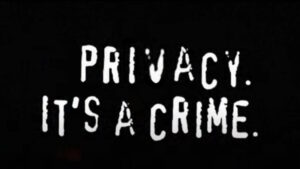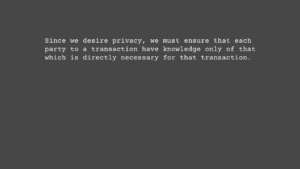We live in an era of rampant data exploitation, where companies harvest personal information with little regard for privacy rights. Unfortunately, the public often does not help itself, only coming to appreciate privacy rights when it’s all but disappeared. In this environment, protecting your privacy is more critical than ever—yet some believe it’s a lost cause.
It is not.
Besides the obvious safety concerns, this is about self-sovereignty and individual agency. Your personal data reveals who you are, and access to this information has rippling effects on free thought and authenticity.
Almost everything is based on information processing—whether it’s online shopping, reading, or getting directions—reliable data underpins everything. But the goal-posts do not change simply because technology makes bad routes easier.
What is Privacy?
People often confuse privacy, security, and anonymity, like when someone claims a product has “no privacy” but means it lacks anonymity. Understanding these distinctions is key to discussing privacy rights.
Privacy
Your data should only be seen by those you choose—whether that’s one person or a hundred—as long as mutual consent is honoured. For example, end-to-end encryption in a chat app ensures only you and the recipient can read your messages.
Security
Security is about trusting the systems you use and verifying the identity of those involved. HTTPS certificates, for instance, secure online browsing by ensuring you’re connected directly to a website, protecting your data from network attacks.
Anonymity
Anonymity lets you act online without being tracked. Tools like the Tor network obscure your IP address to achieve this. Pseudonymity, meanwhile, uses a consistent alias—like @xXxPussySlayerxXx for gaming—that isn’t tied to your real name.
Privacy vs. Secrecy
“I have nothing to hide, so why should I care?”
This refrain misses the mark. Privacy isn’t about hiding; it’s about choosing what to share. It’s a foundation for free speech, association, and assembly—essentials of a democratic society.
The phrase “nothing to hide, nothing to fear” often appears in dystopian stories to justify surveillance. Privacy empowers you to control your narrative.
Arguing that you don’t care about the right to privacy because you have nothing to hide is no different than saying you don’t care about free speech because you have nothing to say.
– Edward Snowden
Is Privacy About Control?
Many define it as controlling who sees your data. It sounds appealing but it’s a trap.
Think about cookie consent forms on websites. You’re bombarded with check boxes and sliders to “customise” your settings, but most people just click “I agree” to move on. Nobody has time for a privacy audit every time they visit a site.
This isn’t accidental. It’s choice architecture, designed to nudge you toward giving up your data by making the process frustrating.
In truth, “privacy control” in most apps and websites is a facade. The options—like “use my data for relevant ads”—look meaningful but rarely are. This design makes you feel guilty, as if you had a real choice and failed to take it.
Most software isn’t built for privacy. True privacy must be embedded at the base layer, not tacked on as an afterthought.
The horizontal layers we use should mirror our innate desire for privacy.
Privacy, Freedom, and Censorship
Losing privacy paves the way to losing freedom.
Blanket surveillance threatens free speech through tactics like shadow-banning, algorithmic censorship, and viewer throttling. These stem from ignoring privacy’s core principles. If your private data isn’t respected, why expect your public voice to be?
Surveillance creates a chilling effect, stifling debate and weakening democracy. When you know you’re being watched privately and punished publicly for “wrong” opinions, you self-censor.
Social platforms like Facebook and LinkedIn, meant to be public squares, often amplify self-censorship. Efforts to censor private messaging apps, like Europe’s Chat Control Bill, push to ban encryption under the guise of “protecting children.”
Apps like Facebook Messenger and WhatsApp are private in name only. If your messages aren’t being monitored, your pings, frequency and location still are. As pressure continues, what’s to stop governments or tech giants from accessing your biometric data or home activities? This inverts the rule of law, treating everyone as a suspect.
Real-time location tracking in apps also threatens freedom of assembly. Constant monitoring risks undermining activism, protests, and free association, which begs the question; have we built our communication systems backwards?
The Slow Erosion of Privacy
Unchecked surveillance is dependent on a nonchalant attitude towards data protection.
Today, democratic freedoms are under immense strain; some would argue the word ‘democracy’ has lost its meaning. And who could blame them? Untrustworthy companies and bureaucrats promise one thing and do another – and (shadow)ban voices that call them out. Addictive application designs distract from data harvesting, and the vulnerable among us are used as a pretext to subvert basic rights and freedoms.
Feigned piety is particularly reprehensible.
Losses are gradual, and the ripple effects are rarely considered. And with political opposition facing outright bans in Europe, the possibility for retroactive persecution is not too far off either.
Privacy exists only if you defend it. Take action—start with tools like GrapheneOS.
Privacy is rarely lost in one fell swoop. It is usually eroded over time, little bits dissolving almost imperceptibly until we finally begin to notice how much is gone.
– Daniel J. Solove
Indeed, privacy exists only to the degree that you’re willing to defend it.
You don’t need to reorganise your entire life overnight, but any action is better than no action.


